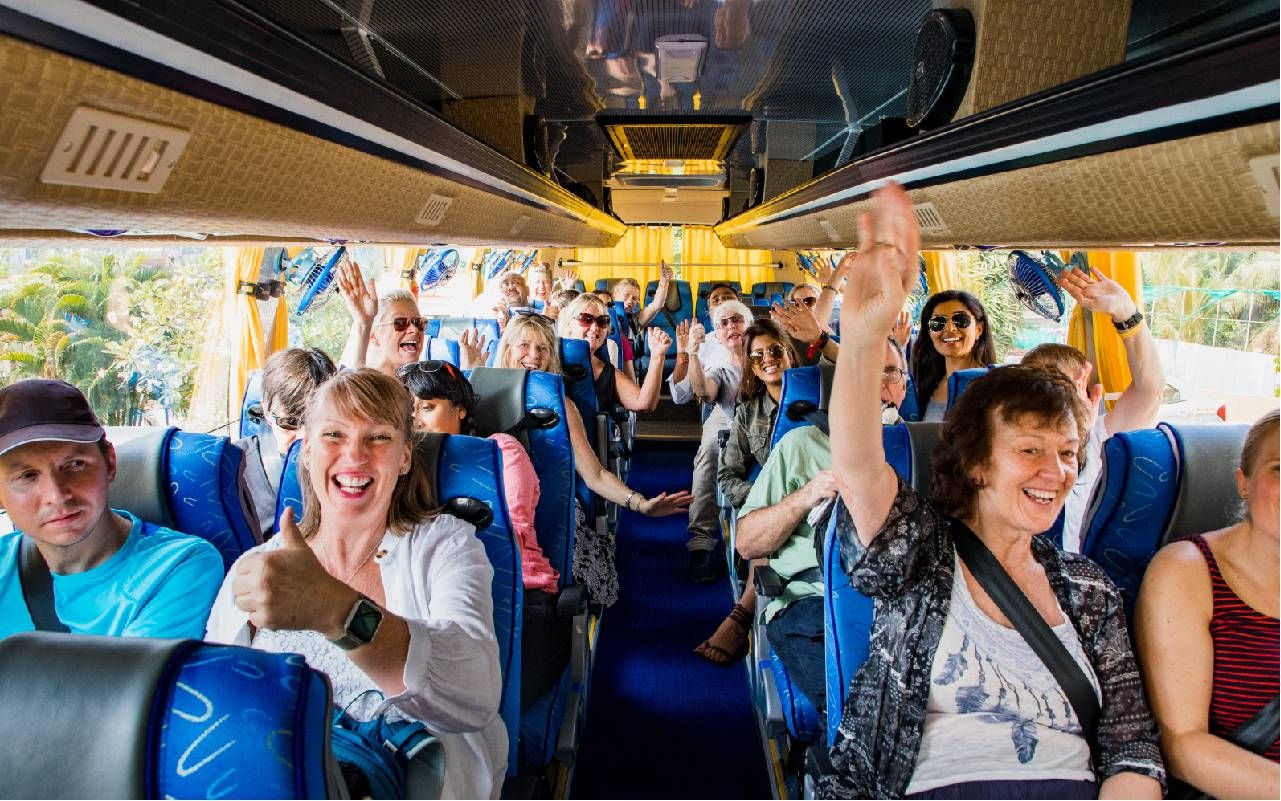Traveling Solo on a Group Trip Can Change Your Life
You may go by yourself, but you won't be alone — and the experience could easily be one you treasure for a lifetime
I enjoy travel, especially when paired with an activity like biking, hiking or trekking. Though I almost always travel by myself, I've participated in around 20 group trips.
As an American I've learned that I prefer international trips organized by non-U.S. based companies for the reason that I meet, interact with and sometimes become good friends with people from varying backgrounds. On these kinds of excursions, I'm not just traveling around in an isolated American-influenced bubble (which is not an inherently bad thing; I just prefer the alternative).

On all my group adventures, I've emerged with at least one new friend.
Research supports the idea that exposure to diverse cultures and people promotes personal growth and learning, which in turn, contributes to keeping your mind sharp and young. The possibility of stagnation and immobility (both mind and body) motivates me to embark on group trips, despite my introvert-influenced reluctance of meeting new people.
I am not adept at navigating social situations nor am I ever "the life of the party" and yet, on all my group adventures, I've emerged with at least one new friend. Scattered across the world, these friends bring me comfort and joy.
We stay in touch and plan subsequent trips together. I have a community not just confined to my own Manhattan neighborhood. It is large; it contains multitudes (to steal a phrase from Walt Whitman).
What the Science Says
An 80 year old Harvard study confirmed that community, relationships and how happy we are in them influences our health as we grow older. As we age, many of us lose people (through death or otherwise) when, arguably, we need them the most.
The sense of wellbeing you get is incredible, the sense of community and support and joy.
"We get lonely and lonelier," said Henry Gold, director of Canada based TDA Global Cycling. "But what happens [on our trips] is exactly the opposite."
As someone who has taken one of TDA's epic cycling trips (three months!), I can corroborate this. As Gold explained, the beauty of a trip like this is that you are "with people who are in some way like you." As a person who often feels as if I do not fit in, this was a revelation.
"The sense of well-being you get is incredible, the sense of community and support and joy. We laugh a lot; we discover new things; we complain about the rain and the wind," Gold said laughing. All true: camaraderie built on collective complaining can be very strong indeed.
Amit Kumar, Ph.D., Asst. Professor of Marketing and Psychology at The University of Texas at Austin, told me about a study where researchers tracked people on a three-week bicycle trip. They kept diaries, writing about things like riding through a downpour and other difficulties. Later, when they recalled these moments, they presented them in a positive light, saying that the adversity led to bonding — that maybe it was a good thing.
Sometimes, the unpleasantness faced by venturing outside your comfort zone transforms into something positive.
Kumar doesn't think they were making this up. Sometimes, he explained, the unpleasantness faced by venturing outside your comfort zone transforms into something positive when we weave it into our narrative.
"It's about deriving meaning and understanding ourselves," said Kumar.
Initially, we only process what's right in front of us, but when we reflect later, we frame experiences in the broader context of our lives in order to make sense of certain events — or at least make sense of them in terms of who we are. The more we have this sense of identity, the better we're likely to feel, he said.
Shy? Don't Let That Stop You.
But, what if I'm the only person there by themselves? Am I too old to make new friends? What if I can't keep up?
"Many people succumb to the myth that they already have all their friends," said Irene S. Levine, PhD, psychologist, friendship expert, and travel journalist. "Nothing could be further from the truth."
Friendships are dynamic, not static, changing throughout our lives as our circumstances do, Levine explained. "Most friendships, even very good ones, don't last forever," she said. But we can always make new ones.
"We hear stories every day from solo participants that they made lifelong friends on our programs, often traveling together again for years after," Kelsey Knoedler Perri of Road Scholar said.
"You might get adopted, no matter how old you are."
It is unlikely, too, that you will be the only one by yourself on a group trip. 25 to 30% of Road Scholar participants each year are solo travelers. Gold confirmed that, on TDA trips, most people come by themselves.
"You might get adopted, no matter how old you are," he added.
If you feel you don't make friends easily, consider a smaller group size (6 to 12 people), said Linda Sapadin, Ph.D, psychologist and success coach.
Call and ask how many people are currently booked before making your final decision. I signed up for a trip where the only other participants were a couple. While they were super friendly, I often felt like a third wheel. Also, I was never able to just fade into the background. I actually like being able to drift in anonymity when I feel like it. With a group that small, the guides almost paid too much attention to me.
As far as worrying about whether or not you can keep up on an active trip, Dermot MacWard of UK-based Red Spokes Tours said, "You never remember how quick you were. Instead, it's the interactions you have along the way."
The Transformative Benefits of Travel — Solo or Otherwise
Travel is an experiential purchase, Kumar told me, a category that includes meals out and attending concerts or events.
"One reason people derive more enduring satisfaction from experiences than from things — an interesting quirk — is that experiences tend to be more broadly social in nature," said Kumar. Beyond the sociality of the experience itself, we also often talk about them more, meaning they contribute to our social lives.
"This greater conversational value seems to add to the happiness people get from them," said Kumar. This may seem obvious, but what makes it a bit more interesting, Kumar pointed out, is that experiences are often thought of as fleeting, lasting a few hours or a week but, when considered in the way Kumar describes, they live on indefinitely in our memories — and in the stories we tell.
As well as all of the above, international group trips provide a cultural aspect, plus the opportunity to expand your horizons, interactions and friendships across national and, sometimes, societal borders. And I don't just mean the local people you may meet on the way but also fellow travelers.
International group trips provide a cultural aspect, plus the opportunity to expand your horizons, interactions and friendships
"You can take people, including those that have issues — however you want to define that — and integrate them into groups and see the pleasure that they get and, well, that's amazing," MacWard told me. These kinds of trips can also be safe spaces.
"People tell me, I've told that person more about me and my life than I've told work colleagues of 30 years," said MacWard.
Red Spokes runs cycling trips in the UK, Europe and beyond, including lesser-traveled destinations like Pakistan with the goal of providing people with positive cultural experiences.
"In the West, most everyone is materialistic, judging one another in terms of money and jobs. But when you go to other countries like Pakistan, the system is quite different. They put a lot more value in how you conduct yourself. Community is regarded highly. They look after their young people and their elderly, which we've lost in the west," said MacWard.
So, Where to Go?
Road Scholar has a collection of programs popular with first-timers. Knoedler Perry also recommends the Signature Cities collection as "a great way to get a deep dive into one city without repacking your suitcase during the week."
Levine suggests a river cruise on the Danube or Rhine where "you can experience different countries, cuisines and customs only by packing and unpacking once" or second cities like Lyon, France or Bologna, Italy which are easier to navigate and less touristed than larger cities.
Committing to a lengthy trip such as the epic offerings of TDA may not be the wisest choice for your first group trip. The cool thing is that the company offers the option of signing up for one-, two- or three-week sections of their tours. The 2023 Pub Ride, for instance, includes a 16-day section that takes you from Dublin to London and the Ruta Maya includes an 18-day option from Antigua to Tulum.
"The scenery's one thing, but actually getting close to the people of the country and the community …"
Red Spokes offers a variety of tours departing this fall in places like Nepal, Cambodia and Vietnam from 12 to 15 days long.
Other tour operators with a more diverse client base include KE Adventures, based in London, and Spice Roads in Thailand. Often, these companies subcontract to local tour operators who have agreements with multiple booking partners. This helps them achieve the participant numbers required to run a particular trip. It also means that the group will likely be made of people from different countries, an added bonus.
"The scenery's one thing, but actually getting close to the people of the country and the community … " said MacWard. He didn't finish his thought but I can: that's the real beauty and the stuff that all great stories are made from.


